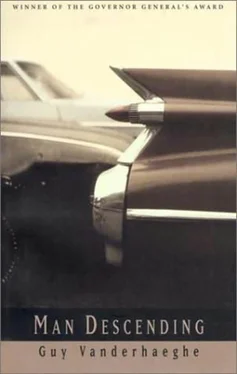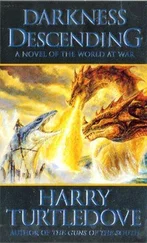Joe was surprised to find that nothing much pleased him. Most things he saw made him feel sad, or lost, or lonely, or guilty. He was sorry to see the English look like the landlords of boarding-houses, possessors of a testy dignity, forced by straitened circumstances into a touchy hospitality.
Where were the healing waters? He might have said that he never expected to find them in London. They were in the Cotswolds. Or Kent. Or Norfolk. Or Yorkshire. But he knew that wasn’t true. He knew that now. The great trees in Hyde Park should have been enough, but weren’t.
He left off sightseeing and began to aimlessly wander the streets. Following his nose, he found himself drawn down narrow alleys daubed with graffiti and slogans. The messages disturbed him. He could see nothing suggestive of the vigour with which they were executed in the tired people he saw in the streets. “No Boks Here!” they said. “CFC Rule OK!” “David Essex Is King!” “Mick Is King!” “Arsenal Rule!” He was not sure why they made him angry, why they upset him. Most of them he couldn’t even understand. Later he had to ask Mark to explain to him what they signified.
At first Joe had imagined them the work of senile, angry old men – they gave off the crazy intensity he associated with an old man’s rage. But in time he came to believe them the handiwork of the bizarre creatures he sometimes came across lounging in subway stations like lizards, bathing themselves in the noise, smells and smuts. Horrible, self-mutilated young people. They flaunted safety-pins driven through their bottom lips, earlobes, nostrils. Bristling porcupine haircuts quivered on their heads, radiating electric rage and venom. They were clad in intricately torn T-shirts and dresses made of shiny green garbage-bags. Joe felt like the discoverer of a whole subterranean culture down in the tube, a whole crazed tribe intent on festooning itself with refuse and offal.
Staring bewildered at them for the first time in the harsh light of the station, he had been frightened, suspicious they might attack him. And then he found himself laughing when he thought of Dryden’s lines:
These Adam-wits, too fortunately free ,
Began to dream they wanted liberty:
And when no rule, no precedent was found ,
Of men by laws less circumscrib’d and bound
They led their wild desires to woods and caves ,
And thought that all but savages were slaves .
His edginess grew. He seemed drawn to the train stations with their dirt and noise and pigeons and stink and movement. He wandered the Embankment and stared at the sullen Thames filled with commerce. It seemed that this stretch of river bank was dotted with old men and old women bundled in unravelling sweaters and shapeless coats, some drunk, some crazy.
Joe began to drink. He sought out pubs seldom frequented by tourists. This was resented. But nevertheless he sat stubbornly in the midst of strangers who talked past him at the bar, who even occasionally made jokes about him while he drank his whiskeys and got falling-down drunk. At afternoon-closing the proprietors turned him out and he took to the streets again. He walked mile after mile, often losing himself entirely in the city. He tramped past the British Museum and its imposing portico with barely a glance. Inside, his son was reading documents. He ignored the blandishments of Madame Tussaud’s, of the Victoria and Albert, of the National Gallery.
He felt he was on the verge of losing control as he had back home. When he was jostled and elbowed and pushed outside Harrods he had sworn viciously and even taken a kick at a man who had stepped on his foot. Yet his behaviour didn’t particularly worry him. He decided that he didn’t give a damn.
In the first week of his visit Joe spent two evenings at his son’s. He climbed three flights of stairs past strange sounds and Asiatic smells to a bed-sitter you couldn’t swing a cat in. His daughter-in-law cooked them pork pies in a tiny range and they drank whiskey that Joe brought with him. Mark and Joe sat at the table on the only chairs, and Joan, his daughter-in-law, sat on the couch with her plate on her knee. Conversation never ran the way it should have. Mark kept asking questions that Joe didn’t consider any of his goddamn business and tried to avoid answering.
“So that thing with the kid is finished now, all cleared up?”
Joe splashed some whiskey in his glass. “Yes,” he said. “It’s finished and I prefer to leave it that way.”
“Why did they decide to drop the charges?”
Joan coughed and gave Mark a warning look. It was funny, she seemed able to read him better than his own son could.
“They settled out of court for a thousand bucks. They said they felt sorry for me, my wife having just died. They talked about the poor kid walking around with wire-cutters in his back pocket, living on soup and milkshakes.”
Mark’s eyes had that squinty, harried look they got when he was worried. He had had that look even as a child. He hated trouble. “I don’t know,” he said. “I can’t imagine you doing that.”
“Maybe you don’t know me as well as you think you do,” said Joe.
He had surprised a lot of people: his principal, himself, the kid most of all. A lot was forgiven because it happened two weeks after the funeral. Everybody thought he had come back to work too soon. But Joe wasn’t sure that he hadn’t understood that would be the reaction before he did what he did. Maybe he had calculated the consequences. He couldn’t remember now.
That particular kid, Wesjik, had been giving him trouble all year. Not that he was especially bad. He was representative of a type becoming more and more common. He did the usual insolent, stupid things: farting noises out of the side of his mouth while Joe read a poem, backchat, bothering people, arriving late for class, destruction of books and school property.
That day Joe had had to tell him at the beginning of class (as he had every day for the past four months) to sit at his desk and get his text out. The boy had given him a witheringly contemptuous smile and, slouching to his place, said: “You got it. Sure thing.”
Joe had ignored him. “Open your books to page 130, Grade Twelve,” he said, “and we’ll begin the class with Tennyson’s ‘The Splendor Falls’.” After the books had all thumped open and the banging and foot-shuffling had subsided, Joe gave a little hitch to his voice and read, “The splendor falls -”
And there he was interrupted by a voice from the back of the room, brazen and sullen, “on shit-house walls.” There was laughter. Most of it nervous. Some encouraging.
Joe looked up from his book. He knew who had said that. “Mr. Wesjik,” he said, “get your carcass out of this room.”
“I didn’t say nothing,” the kid shot back, his face set in a mockery of innocence. “How could you know who said anything? You were reading.” A courtroom lawyer.
Joe closed the book and carefully put it down. “You come along with me, Wesjik,” he said. There were titters when the kid, grinning, followed him out of the room. A trip to the office. It didn’t mean anything any more.
And that was where Joe had intended to take him when they set out. But there was something about the way the kid slouched along, lazily and indifferently swivelling his hips, that grated. Joe changed his mind on the way. He led Wesjik into the vestibule where the student union soft-drink machine was kept, and pulled the doors closed behind him.
“What’s this?” said Wesjik. “How come I’m not going to the office?”
“You like talking to Mr. Cooper, don’t you?” asked Joe, adopting an artificially pleasant tone. Cooper was a smooth-cheeked character with a master’s degree in educational administration. Joe thought he was a dink, although he never mouthed off about Cooper in the staff-room the way some others did.
Читать дальше












